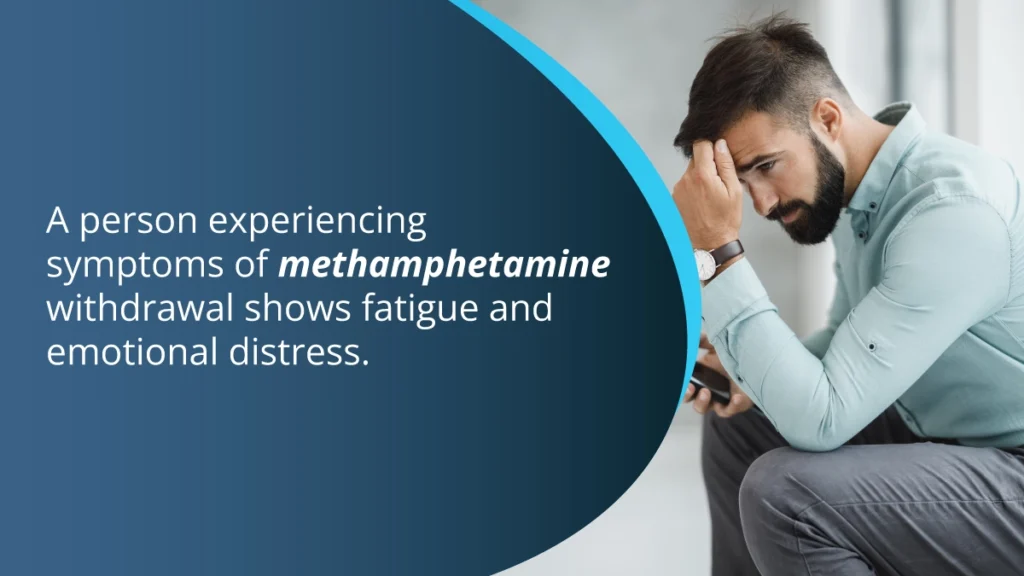Methamphetamine withdrawal involves a range of symptoms that can vary in severity. These symptoms include fatigue, depression, and intense cravings. Physical effects may involve changes in appetite, sleep disturbances, and body aches. Emotional symptoms often include mood swings and anxiety.
The withdrawal process is vital for those working towards recovery, as it helps the body and mind adjust to a new, healthier state. Monitoring these symptoms can provide important insights into the recovery journey, helping to ensure that individuals receive the necessary support during this time.
Key Takeaways
Methamphetamine withdrawal causes symptoms like fatigue, intense cravings, mood swings, and disturbed sleep. Here’s what you need to know:
- Methamphetamine withdrawal encompasses diverse physical and psychological symptoms with a variable timeline.
- Methamphetamine withdrawal involves symptoms like fatigue and cravings and effective strategies for recovery.
- Methamphetamine withdrawal triggers fatigue, mood swings, and sleep issues, requiring coping strategies for adequate recovery.
The Haven Detox-Little Rock offers transformative and innovative treatments, guiding individuals through recovery. For more information, call us at (501) 271-3342.

Methamphetamine: Explained
Methamphetamine is a powerful stimulant affecting the central nervous system. It can significantly change mood, behavior, and physical health. The drug increases levels of dopamine in the brain, leading to intense euphoria but also long-term damage. Learning about methamphetamine’s effects is vital for those seeking to address its impact effectively.
Importance Of Understanding Withdrawal Symptoms
Knowing about withdrawal symptoms is essential for managing the recovery process. Withdrawal involves physical and emotional challenges as the body adjusts to the absence of methamphetamine. Identifying these symptoms helps in providing appropriate support and treatment. Learning about withdrawal is a vital step towards effective recovery and long-term well-being.
Methamphetamine Withdrawal: Explained
The withdrawal of methamphetamine (crystal meth) is a crucial phase as the body and mind adapt to life without methamphetamine. This process, though challenging, is an essential part of the recovery journey.
Meth withdrawal encompasses a range of physical and psychological effects experienced when one stops using the drug and other substance abuse disorders. It’s a unique experience for each person, and various factors influence its intensity.
Causes And Mechanisms
Withdrawal symptoms occur because methamphetamine affects the brain’s neurotransmitter systems. The body and brain need time to readjust to functioning without the drug. This adjustment can lead to a range of physical and psychological symptoms.
Stages Of Methamphetamine Withdrawal
The withdrawal process unfolds in different stages, each with its symptoms and challenges. Knowing these stages can help one prepare for and manage the symptoms effectively.
Acute Withdrawal
Acute withdrawal typically begins within the first few days after stopping methamphetamine. This stage often involves intense cravings, fatigue, and mood swings. The severity of symptoms can peak during this period. Monitoring and support are essential to navigate this critical stage.
Sub-Acute Withdrawal
The sub-acute withdrawal follows the acute phase and can last several days to a few weeks. Symptoms during this stage may include fatigue, mood changes, and sleep disturbances. Cravings for methamphetamine may persist but usually begin to decrease. This stage is essential for continued care and support.
Post-Acute Withdrawal Syndrome (PAWS)
Post-acute withdrawal syndrome (PAWS) may last for months after the initial withdrawal period. Post-acute withdrawal syndrome (PAWS) includes symptoms like anxiety, depression, and occasional cravings. It can impact daily functioning and emotional well-being. Long-term support is vital for managing post-acute withdrawal syndrome (PAWS) effectively.
Common Methamphetamine Withdrawal Symptoms
Methamphetamine withdrawal, also known as crystal meth withdrawal, involves a variety of physical and psychological symptoms. Identifying these symptoms can help in seeking appropriate treatment and support.
Physical Symptoms
Fatigue during withdrawal is often a deep sense of tiredness and a significant lack of energy. This exhaustion can make even simple tasks seem challenging. Increased appetite is another common symptom, marked by a noticeable rise in hunger and food intake, which can affect dietary habits.
Sleep disturbances, including difficulties with falling or staying asleep and insomnia, further complicate the withdrawal experience. Additionally, individuals may experience muscle aches and pains, leading to general discomfort and muscle soreness.
Psychological Symptoms
Depression during withdrawal is characterized by feelings of sadness and hopelessness that significantly impact mood and daily life. Individuals may experience an overwhelming sense of despair, making daily activities challenging.
Anxiety also plays a role, manifesting as increased worry or nervousness that can become all-consuming. Alongside these emotional symptoms, irritability may arise, resulting in heightened sensitivity and frustration over minor issues.
Timeline Of Methamphetamine Withdrawal
The timeline of meth withdrawal symptoms can vary widely, but there are general patterns. Learning these stages helps in preparing for and managing the withdrawal process.
Initial 24-48 Hours
During the first 24-48 hours, symptoms such as intense cravings and fatigue often emerge. It is the onset of the acute withdrawal phase, where the body begins to react to the absence of methamphetamine. Emotional symptoms like irritability and anxiety can also be prominent. Immediate support is vital during this initial period.
Days 3-10
The symptoms usually peak around days 3 to 10. Cravings may remain strong, fatigue may persist, and mood swings may occur. Sleep patterns may be disrupted, and individuals might experience fluctuations in appetite. Continued medical care and support are essential during this phase.
Weeks 2-4
By weeks 2 to 4, many physical symptoms start to decrease, though psychological symptoms may continue. Fatigue and cravings may lessen, but mood swings and sleep issues might persist. This phase is often characterized by gradual improvement, but ongoing support remains essential. It marks a transition from acute to sub-acute withdrawal.
Beyond One Month
Beyond one month, symptoms can continue to diminish, though psychological challenges might still be present. Post-acute withdrawal syndrome (PAWS) may manifest with lingering anxiety and mood changes. Continued care and support are vital for long-term recovery. Monitoring progress helps in addressing any remaining symptoms.
Factors Influencing Withdrawal Severity
Several factors can influence the severity and duration of the symptoms of meth withdrawal. Learning these factors can help tailor effective treatment and support strategies.
Duration Of Usage
The length of time methamphetamine was used can impact the severity of withdrawal symptoms. More extended usage periods often result in more intense withdrawal experiences. The body and brain require more time to recover from prolonged exposure to the drug. Tailoring support based on usage history is essential.
Dosage And Frequency
The amount and frequency of methamphetamine use also play a role in withdrawal severity. Higher doses and frequent use can lead to more pronounced withdrawal symptoms. Adjustments to treatment and support may be necessary based on these factors. Learning the dosage history helps in predicting withdrawal challenges.
Individual Health Factors
Personal health conditions and overall physical health can influence how withdrawal symptoms are experienced. Pre-existing health issues may complicate the withdrawal process. Addressing these health factors is vital for effective symptom management. Personalized care plans can enhance the recovery process.
Co-Occurring Disorders
Co-occurring mental health disorders can affect withdrawal severity and recovery. Conditions such as anxiety or depression may interact with withdrawal symptoms. Integrated treatment plans that address both substance use and mental health issues are crucial.
Clinical Evaluation
Regular clinical evaluations can provide insights into the progression of withdrawal symptoms. These evaluations help in adjusting meth addiction treatment programs based on observed symptoms. Accurate assessment is vital for effective management. Continuous monitoring supports optimal recovery outcomes.
Self-Reported Symptoms
Self-reported symptoms from individuals undergoing withdrawal provide valuable information, helping to understand the personal experience of withdrawal. Effective treatment plans incorporate these self-reports for a more tailored approach, and regular communication enhances the management process.
Use Of Standardized Scales
Standardized scales can objectively measure the severity of withdrawal symptoms. These tools provide a consistent framework for evaluating progress, assessing changes, and adjusting treatment strategies. Utilizing these scales ensures a systematic approach to managing withdrawal.
Treatment And Management Of Withdrawal Symptoms
Effective treatment and management are crucial for easing the withdrawal process. Various methods and interventions can support individuals through this challenging time.
Medical Detoxification
Medical detoxification involves supervised withdrawal in a clinical setting. This process ensures safety and provides necessary medical support. Medical detox helps manage severe symptoms and prepares individuals for further treatment. Detoxification is a foundational step in the recovery journey.
Pharmacological Interventions
Certain medications are used by medical professionals to alleviate withdrawal symptoms and support recovery, addressing issues such as mood swings and sleep disturbances. These medications play a crucial role in easing the discomfort associated with withdrawal and enhancing overall well-being.
Additionally, ongoing research is dedicated to exploring new treatments and medications to improve withdrawal management. Innovations in pharmacological therapies offer the potential for enhanced support and more effective management of symptoms.
Behavioral Therapies
Cognitive behavioral therapy (CBT) is a practical approach that helps individuals tackle negative thought patterns and behaviors associated with substance use. By providing tools to manage cravings and develop coping strategies, cognitive behavioral therapy (CBT) supports the process of recovery. This therapy focuses on changing harmful thinking patterns and promoting healthier behaviors.
Additionally, contingency management is a valuable technique that uses rewards to encourage positive behavior changes. It reinforces sobriety and adherence to treatment goals, making it a key component of behavioral therapies.
Tips For Coping With Withdrawal
Coping strategies are essential for managing withdrawal symptoms effectively. Implementing these tips can enhance the recovery experience.
Establishing A Support System
Building a solid support system is vital for managing withdrawal symptoms. Support from family, friends, and professionals can provide encouragement and practical help. Engaging in support groups or therapy can offer additional assistance. A robust support network contributes significantly to the recovery process.
Healthy Lifestyle Choices
Maintaining a balanced diet is vital for overall health and recovery during methamphetamine withdrawal. Proper nutrition helps manage physical symptoms and boosts energy levels, which can be particularly beneficial during this challenging time.
A well-rounded diet supports the body’s healing process and enhances overall well-being. In addition, regular physical exercise plays a crucial role in supporting both physical and mental health. Exercise helps alleviate fatigue and improves mood, which are common during withdrawal. By incorporating regular physical activity into daily routines, individuals can enhance their overall health and contribute positively to their recovery.
Mindfulness And Stress Management Techniques
Practicing mindfulness and stress management can improve emotional resilience. Techniques such as meditation and deep breathing help manage anxiety and stress. Developing these skills can enhance overall well-being and recovery. Incorporating mindfulness practices supports a balanced approach to managing withdrawal.
Long-Term Recovery And Relapse Prevention
Long-term recovery involves ongoing care and strategies to prevent relapse. A solid recovery plan is essential for maintaining progress and ensuring lasting success.
Continuing Care Options
Continuing care options like outpatient therapy and support groups are essential for sustained recovery. These resources offer ongoing support and guidance. Engaging in continuing care helps individuals stay committed to their recovery goals, and consistent participation reinforces positive changes.
Importance Of Aftercare Programs
Aftercare programs play a crucial role in long-term recovery. They provide structured support and resources as individuals transition from intensive treatment. Aftercare programs help address any emerging challenges and reinforce recovery strategies. Participating in aftercare programs supports ongoing success.
Strategies For Preventing Relapse
Developing effective strategies for preventing relapse is essential for maintaining long-term recovery. These include identifying triggers, creating coping plans, and seeking ongoing support. Building a solid support network and practicing healthy habits are vital for preventing relapse. Consistent effort and preparation contribute to a successful recovery journey.




